Ambiences and Tendencies
 |
 |
 |
 |
 |
 |
 |
The Vatican’s Nostalgia for the Beatles
On September 15, 2016, the Vatican newspaper L’Osservatore Romano released a review of Ron Howard’s documentary “Eight Days a Week – The Touring Years” focusing on the early years of the Beatles. By producing this review and commenting on the band that greatly influenced the tumultuous ‘60s, the newspaper allowed itself to be swept up in a radiant admiration for a band that literally advocated for some of the worst vices of man.
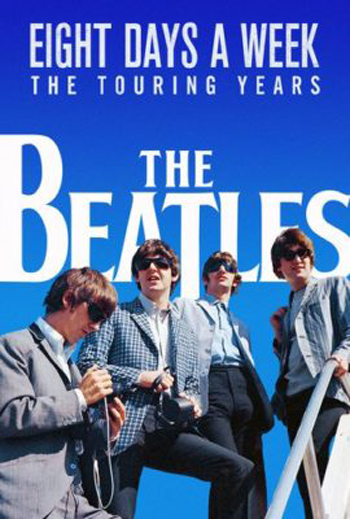 With rose colored glasses, L’Osservatore Romano takes the documentary as an opportunity to engage in Beatles nostalgia. The newspaper makes no condemnation of the immorality preached by the young men of Liverpool nor any attempt to elaborate on the rock band's controversy. Rather, the Vatican newspaper basks in admiration for its musical works and highlights the growth and change of the individuals that took place over time. The article reflects on their “incredible” personalities, as well as their “gift” for music.
With rose colored glasses, L’Osservatore Romano takes the documentary as an opportunity to engage in Beatles nostalgia. The newspaper makes no condemnation of the immorality preached by the young men of Liverpool nor any attempt to elaborate on the rock band's controversy. Rather, the Vatican newspaper basks in admiration for its musical works and highlights the growth and change of the individuals that took place over time. The article reflects on their “incredible” personalities, as well as their “gift” for music.
One would think that such admiration seems more appropriate for the personal opinion of a diehard fan rather than an organ of the Catholic Church. Considering the controversy surrounding the Beatles, their impact on society and how they embodied their personal “values,” this review leaves the Vatican even more open to criticism for this problematic praise.
From an historical perspective, the “Fab Four” of Liverpool played a vanguard role in the Cultural Revolution that rocked Western Civilization to its very core. Hardly would the ’60s, the era of hippies, free-love and anarchy, be the same without these four young men preaching to their followers through their songs. Taking the stage, the Beatles would literally sing the praises of sex, drugs and rebellion and then retire from the performance to be chased by crazed mobs of girls ready to tear them apart limb from limb in their excitement.
Their fame coincided perfectly with a generation of disaffected youth that, following the dictates of the modern world, felt a burning need to break with the “stifling” mold of their parents. It was an appeal to the twin pillars of pride and sensuality – and the results were insanity.
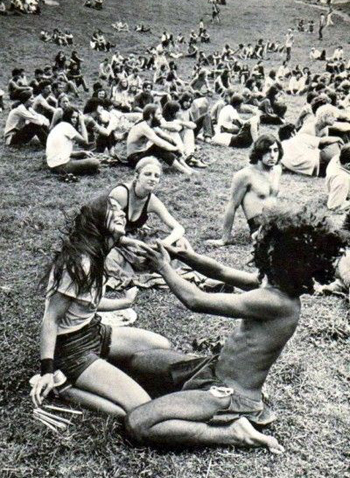
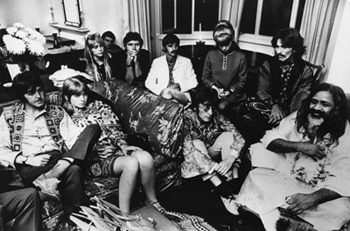 As the ‘60s exploded into an orgiastic festival of self-indulgence, flagrant and degrading promiscuity, and mind-destroying narcotics, the Beatles rode the wave of their rising star. In many ways the legacy of the ‘60s opened the door to the problems facing society today: rampant divorce, children born out of wedlock and the ever advancing front of the homosexual militants.
As the ‘60s exploded into an orgiastic festival of self-indulgence, flagrant and degrading promiscuity, and mind-destroying narcotics, the Beatles rode the wave of their rising star. In many ways the legacy of the ‘60s opened the door to the problems facing society today: rampant divorce, children born out of wedlock and the ever advancing front of the homosexual militants.
What kind of legacy is this for the Vatican to praise? As an exercise in reason and to alleviate the scandal caused by such admiration, perhaps the writer for L’Osservatore Romano should stop to comment and condemn what these four young men were beckoning their listeners to do when they sang words like “Why Don’t We Do It in the Road,” “Happiness is a Warm Gun,” and “I Get High with a Little Help from My Friends.” Sadly, these lyrics are but a scant few chosen out of the filthy sea of demeaning verses to come from the Fab Four.
To them the human body was nothing more than an instrument, a tool by which maximum degrading and destructive pleasure could be derived. Even their initial clean and suited appearance was adopted only because they were paid better to do so. Soon their look would become as dirty as their songs.
Rather than considering the lifestyle and message of the Beatles, the Vatican newspaper chooses to praise their well-performed music and the feel-good appearance exuded by their smiling faces. Their music could be pleasant, appealing even, but it is designed to be so. Well-arranged chords do not redeem a song if it is written with the express purpose to induce youths to sin, just as nice words do not redeem a man if his intention is to seduce another man’s wife.
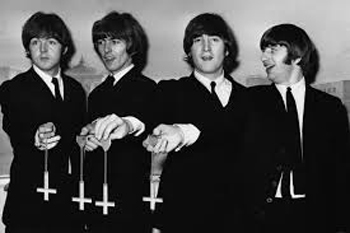 The musical genius of the Beatles, if it truly was genius, was put to an evil use, leading youth to liberate their unruly passions from all sense and rational control. How many souls are in Hell because they were swept up in the mindless orgy of love, sex and drugs advocated by these singers from Liverpool?
The musical genius of the Beatles, if it truly was genius, was put to an evil use, leading youth to liberate their unruly passions from all sense and rational control. How many souls are in Hell because they were swept up in the mindless orgy of love, sex and drugs advocated by these singers from Liverpool?
It is true that the Vatican article does try to maintain a vague semblance of impartiality. By reporting on the movie and not the Beatles themselves, L’Osservatore Romano attempts to avoid the onus of judgment. But, should not the newspaper report on the immoral and sometimes outright anti-Catholic behavior of the Beatles? The infamous comment by John Lennon that he was more famous than Jesus Christ needs no elaboration, yet the Beatles scorn for the Catholic Religion goes deeper.
Various sources demonstrate that the Beatles were not just indifferent, but harbored outright hostility towards Christianity. Several works have pointed out the satanic elements in their musical careers. What can be said of their experiments with mind-altering narcotics and Eastern occultism? The drug-induced revolution of the mind compliments the sex-glutted revolution of the body.
To summarize: The Vatican newspaper notes with relish that “Eight Days a Week – the Touring Years” bypasses the controversy surrounding the Beatles legacy. On this pretense, the article then waxes into a nostalgia clouded panegyric of the Liverpool four, omitting criticism and proffering outright praise.
What this constitutes in essence is the Vatican's journal honoring a band of four deviant musicians that advocated for the complete obliteration of an upright command of the intelligence, will and senses in favor of a sensual explosion engaging in all the deranged and hedonistic vices of man. How many of these Beatle fans, following the utopic dreams of the Cultural Revolution, have ended in the burnt husk of the withered and drugged up old hippie?
A note to my readers: Many attempt to defend the Beatles because they were popular or because of their so-called musical skill. I ask you, instead, to look at them and what they said, to see what they stood for. Is this really something worthy of our admiration? I ask you to use reason, and not defend them based on the pleasantness of their music or the nostalgia they evoke. Rather, judge them for who they were and what they preached. What did the Beatles stand for? What message did they spread? What kind of life did they call their followers to lead?
Judge them for their ideas, not for their popularity. Judge them for their actions and by the fruits of their actions, rather than follow subjective emotions. They are a band that literally preached in favor of casual and degrading sex. Their lyrics are indisputably riddled through with obscenities and smut. They led appallingly deranged sex lives. They participated in substance abuse and their example became an occasion for thousands more to experiment with dangerous narcotics.
At least two of the ‘Fab Four’ thought they were the greatest persons to grace the planet. and in the end the gang broke up because they couldn’t even stand each other. After the split they proved they had little individual talent.
Can one, thus, look at the Beatles with intellectual objectivity and deem them worthy of veneration and praise?
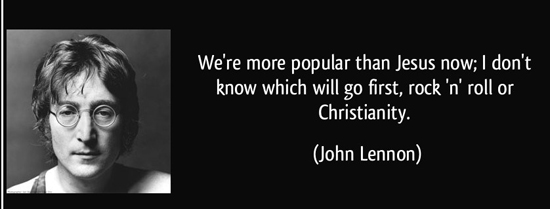


The Vatican effusively praises the Beatles documentary
One would think that such admiration seems more appropriate for the personal opinion of a diehard fan rather than an organ of the Catholic Church. Considering the controversy surrounding the Beatles, their impact on society and how they embodied their personal “values,” this review leaves the Vatican even more open to criticism for this problematic praise.
From an historical perspective, the “Fab Four” of Liverpool played a vanguard role in the Cultural Revolution that rocked Western Civilization to its very core. Hardly would the ’60s, the era of hippies, free-love and anarchy, be the same without these four young men preaching to their followers through their songs. Taking the stage, the Beatles would literally sing the praises of sex, drugs and rebellion and then retire from the performance to be chased by crazed mobs of girls ready to tear them apart limb from limb in their excitement.
Their fame coincided perfectly with a generation of disaffected youth that, following the dictates of the modern world, felt a burning need to break with the “stifling” mold of their parents. It was an appeal to the twin pillars of pride and sensuality – and the results were insanity.

An era of free love & drugs unleashed by the Beatles; below, introducing Hinduism with guru Maharishi

What kind of legacy is this for the Vatican to praise? As an exercise in reason and to alleviate the scandal caused by such admiration, perhaps the writer for L’Osservatore Romano should stop to comment and condemn what these four young men were beckoning their listeners to do when they sang words like “Why Don’t We Do It in the Road,” “Happiness is a Warm Gun,” and “I Get High with a Little Help from My Friends.” Sadly, these lyrics are but a scant few chosen out of the filthy sea of demeaning verses to come from the Fab Four.
To them the human body was nothing more than an instrument, a tool by which maximum degrading and destructive pleasure could be derived. Even their initial clean and suited appearance was adopted only because they were paid better to do so. Soon their look would become as dirty as their songs.
Rather than considering the lifestyle and message of the Beatles, the Vatican newspaper chooses to praise their well-performed music and the feel-good appearance exuded by their smiling faces. Their music could be pleasant, appealing even, but it is designed to be so. Well-arranged chords do not redeem a song if it is written with the express purpose to induce youths to sin, just as nice words do not redeem a man if his intention is to seduce another man’s wife.

From their early career, a disdain for the symbols of Christ
It is true that the Vatican article does try to maintain a vague semblance of impartiality. By reporting on the movie and not the Beatles themselves, L’Osservatore Romano attempts to avoid the onus of judgment. But, should not the newspaper report on the immoral and sometimes outright anti-Catholic behavior of the Beatles? The infamous comment by John Lennon that he was more famous than Jesus Christ needs no elaboration, yet the Beatles scorn for the Catholic Religion goes deeper.
Various sources demonstrate that the Beatles were not just indifferent, but harbored outright hostility towards Christianity. Several works have pointed out the satanic elements in their musical careers. What can be said of their experiments with mind-altering narcotics and Eastern occultism? The drug-induced revolution of the mind compliments the sex-glutted revolution of the body.
To summarize: The Vatican newspaper notes with relish that “Eight Days a Week – the Touring Years” bypasses the controversy surrounding the Beatles legacy. On this pretense, the article then waxes into a nostalgia clouded panegyric of the Liverpool four, omitting criticism and proffering outright praise.
What this constitutes in essence is the Vatican's journal honoring a band of four deviant musicians that advocated for the complete obliteration of an upright command of the intelligence, will and senses in favor of a sensual explosion engaging in all the deranged and hedonistic vices of man. How many of these Beatle fans, following the utopic dreams of the Cultural Revolution, have ended in the burnt husk of the withered and drugged up old hippie?
A note to my readers: Many attempt to defend the Beatles because they were popular or because of their so-called musical skill. I ask you, instead, to look at them and what they said, to see what they stood for. Is this really something worthy of our admiration? I ask you to use reason, and not defend them based on the pleasantness of their music or the nostalgia they evoke. Rather, judge them for who they were and what they preached. What did the Beatles stand for? What message did they spread? What kind of life did they call their followers to lead?
Judge them for their ideas, not for their popularity. Judge them for their actions and by the fruits of their actions, rather than follow subjective emotions. They are a band that literally preached in favor of casual and degrading sex. Their lyrics are indisputably riddled through with obscenities and smut. They led appallingly deranged sex lives. They participated in substance abuse and their example became an occasion for thousands more to experiment with dangerous narcotics.
At least two of the ‘Fab Four’ thought they were the greatest persons to grace the planet. and in the end the gang broke up because they couldn’t even stand each other. After the split they proved they had little individual talent.
Can one, thus, look at the Beatles with intellectual objectivity and deem them worthy of veneration and praise?

A boasting quote that reveals the intent behind the rock revolution

Posted September 28, 2016
______________________
______________________








